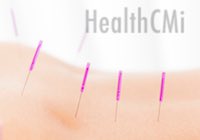Acupuncture pretreatment increases survival rates in cases of heart attacks. Needling acupuncture point PC6 (Neiguan) protects the heart. The benefit is measurable through gene expression, histology and enzyme sections. Researchers conducted a placebo controlled experiment comparing real acupuncture with sham acupuncture.  Preventative acupuncture care reduces damage to the heart from myocardial ischemia reperfusion, a condition that occurs during heart attacks causing tissue damage. Two key physiological findings were that acupuncture reduces arrhythmias and infarction size.
Preventative acupuncture care reduces damage to the heart from myocardial ischemia reperfusion, a condition that occurs during heart attacks causing tissue damage. Two key physiological findings were that acupuncture reduces arrhythmias and infarction size.
Reperfusion damage is caused by the return of blood circulation after a period of ischemia, restricted blood supply. The sudden return of blood to oxygen and circulation deprived tissues causes inflammation and oxidative stress. In this study, acupuncture prevented damage to the heart caused by reperfusion. The laboratory findings measured that acupuncture prevents this damage by regulating enzyme secretions and gene expression. Lab results also demonstrate that acupuncture prevents proinflammatory responses by regulating oxidative stress, calcium channels and many other biological pathways in a broad cascade of healthy effects.
The laboratory experiment revealed that acupuncture successfully downregulated serum concentrations of CK, LDH, CK-Mb, and plasma levels of cTnT. These enzymes are proteins that significantly increase in concentration after myocardial ischemia reperfusion. Electroacupuncture at PC6 successfully reversed this pathological response.
Hundreds of genes are known to increase and decrease in concentration following myocardial ischemia reperfusion. Electroacupuncture uniquely affected genes through several pathways when compared with sham acupuncture. An RNA evaluation revealed that acupuncture successfully regulated gene expression in multiple pathways including MAPK signaling, cytokine, oxidative stress, cardiac muscle contraction, B-cell receptor and leukocyte pathways.
The research team cited one of these pathways as essential to protecting the heart. Myocardial ischemia reperfusion upregulates genes (Myh7b, My13…) relating to pathology in cardiac muscle contraction. This leads to poor functioning of the left ventricle. The research team notes that electroacupuncture pretreatment successfully “reversed” this pathological gene expression.
Myocardial ischemia reperfusion also causes oxidative stress leading to pathological changes in cell calcium levels. This contributes to morbidity and mortality. A sudden influx of calcium increases through an L-type calcium channel and causes heart diseases. Electroacupuncture pretreatment successfully downregulated this pathological response. The researchers note that this suggests a cardioprotective effect of acupuncture.
Numerous other pathways demonstrated the same healthy effects of acupuncture pretreatment on heart tissue and function. The researchers conclude, “PC6 Neiguan acupoint specifically regulated cardiac muscle contraction, vascular smooth muscle contraction, hypertrophic cardiomyopathy, oxidative phosphorylation, inflammation and immune response, and apoptosis pathways, thus effectively protected against I/R (myocardial ischemia reperfusion) injury in a pretreatment approach.” 
The findings demonstrate that acupuncture care helps to prevent damage to the heart in cases where there is a sudden lack of blood, oxygen and nutrients. This investigation looks at the effects of acupuncture in a pretreatment scenario and therefore points to acupuncture as preventative care for the heart. Acupuncture’s cardioprotective effects have now been documented through numerous biomedical tests in study.
Reference:
Huang, Yan, Sheng-Feng Lu, Chen-Jun Hu, Shu-Ping Fu, Wei-Xing Shen, Wan-Xin Liu, Qian Li et al. "Electro-Acupuncture at Neiguan Pretreatment Alters Genome-Wide Gene Expressions and Protects Rat Myocardium against Ischemia-Reperfusion." Molecules 19, no. 10 (2014): 16158-16178.


